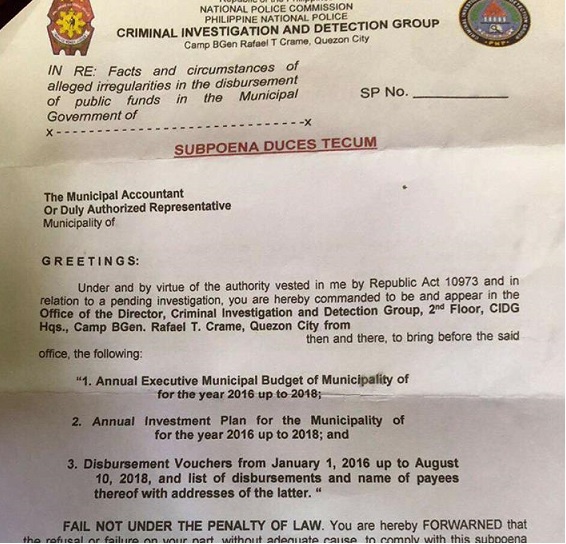
The Department of the Interior and Local Government (DILG) has directed the Crime Investigation and Detection Group (CIDG) to investigate at least 37 towns and cities as early as August for alleged “irregularities in their disbursement of public funds.”
A copy of a subpoena obtained by VERA Files shows the CIDG has “commanded” a municipal accountant to make a personal appearance in their office and produce the following documents:
- Annual executive municipal budget for the year 2016 to 2018;
- Annual investment plan for the year 2016 to 2018; and
- Disbursement vouchers from Jan. 1, 2016 to Aug. 10, 2018.
It said failure to comply “without adequate cause…shall be deemed an Indirect Contempt of Court,” which is punishable by a fee of up to P5,000 and/or at most one month in prison.
The letter was signed by CIDG director Roel Obusan, one of three persons allowed by the controversial Republic Act (RA) 10973 to issue a subpoena in aid of an ongoing investigation.
CIDG chief legal officer Joseph Orsos, the person in-charge of drafting the subpoenas, refused to disclose which municipalities were under investigation. He however said there were four among the 37 that did not comply with the order.
“This is actually a test case…We are preparing the petition for indirect contempt against doon sa mga accountant na hinihingan namin ng (the accountants from whom we are demanding the) documents,” he told VERA Files in a phone interview on Oct. 12.
But human rights lawyer Jose Manuel Diokno, also in a phone interview, said he finds the investigations “alarming” and highly unusual.
“Ngayon ko lang na-encounter na iyong PNP (Philippine National Police) iyong humihingi ng ganyan…Bakit ang CIDG ang nagi-imbestiga niyan? Di ba dapat Ombudsman (This is the first time I’ve encountered the PNP demanding such documents. Why is the CIDG the one investigating these matters? Isn’t it supposed to be the Ombudsman)?” he said.
The CIDG is mandated to undertake the monitoring, investigation and prosecution of all crimes involving economic sabotage, those involving professional and organized crime groups, and major cases that involve violations of the Revised Penal Code, as stated in RA 6975.
The Ombudsman, on the other hand, is the designated “watchdog” for the misuse of public funds because of its independence from the executive department, Diokno said.
Independence is crucial in such investigations to avoid allegations of “politicking” especially as the country nears the 2019 elections, he added.
On whether the issue falls within their jurisdiction, Orsos said the CIDG just does what it’s told.
“There are a lot of complaints from ordinary citizens about these anomalies…so we have to take action on that. The DILG should take action on those complaints, and then for us, we just take action on the directive of the DILG,” he said in a mix of English and Filipino.
Last June 27, DILG Officer in Charge Eduardo Año in a radio interview said his department had already started compiling complaints against elected local officials which would be the basis of their investigation. It publicly launched its Bantay Korapsyon program on Oct. 3 as part of President Rodrigo Duterte’s crackdown on corruption.
Gilbert T. Andres, chairperson of Advocates for Freedom of Expression Coalition-Southeast Asia, said the subpoena issued by the CIDG to LGUs is an example of the dangers of RA 10973, signed by Pres. Duterte last March 1.
RA 10973, which amended the 1990 RA 6975 that established the PNP under a reorganized DILG, is unconstitutional, he said.
Andres further said, “RA 10973, as worded, has the great potential to be used in an overbroad manner for any purpose under the sun that may be outside of the mandate of the CIDG. Also, the broad scope of RA 10973 to subpoena any documents for any generic purpose is essentially an executive search warrant that also violates ART III, Section 2 of the Constitution which only gives to Judges the authority to issue search warrants for specified purposes.”
“Hence, RA 10973,on its face and as potentially applied, is unconstitutional and should be a cause for grave concern for every Filipino, especially since it carries with it the potential sanction of contempt proceedings,” he added.